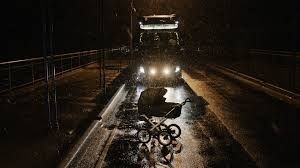
Working with screenwriter Anders Thomas Jensen, Danish director Susanne Bier makes modern morality tales. What would you do if your brother was missing presumed dead in a war zone, you started dating his widow and then your brother returned from combat alive? That was the premise of Bier’s 2004 film, Brothers, remade by Jim Sheridan five years later. A Second Chance (En Chance Til) asks: if your baby died, would you take the child of a junkie couple and raise it as your own?
Bier makes films from the perspective of the Danish middle class. They have nice spacious houses, are well-attired and shower every morning after sex that almost certainly involves jump cuts – Bier loves jump cuts. Her camera keeps close to the action, following the actors. She doesn’t do subjective point of view shots. Her characters are contrasted with the grimy milieu in which they operate. A Bier protagonist will typically appear to be the guardian of moral good sense – just, noble. However, they are exposed as flawed and weak.
In A Second Chance, Game of Thrones star Nikolaj Coster-Waldau plays Andreas, a cop who has a beautiful young wife, Anna (Maria Bonnevie) and a baby, Alexander, who won’t go to sleep. Andreas and Anna fuss over who will take the baby out for a drive (in his case) or a walk (in hers) late at night to lull it to sleep. Andreas is investigating a junkie, Tristan (Nikolaj Lie Kaas) who has just got of prison and who appears to be abusing his girlfriend and their young baby, who is found lying in its own faeces. Social services are unable to act because the mother hasn’t been declared incompetent, even though there is ample evidence that she is using. One night, Alexander doesn’t wake up. Andreas wants to call an ambulance; Anna begs him not to. He agrees, parks his car outside a hospital, phones his partner (who is drunk in a bar and unable to respond) and then decides to break into Tristan’s apartment, switching his dead son for a live but soiled baby.
Does Andreas think his wife won’t notice? This barely becomes an issue. Tristan discovers the corpse and panics. His girlfriend insists, ‘it is not my child’. Tristan comes up with an audacious plan, one which brings him back face to face with Andreas. Meanwhile Anna’s psychosis takes a turn for the worse.
Bier and Jensen are great at putting their protagonist in jeopardy. But after the first few developments, the film runs out of steam. Bier is too honest to keep a plot twisting for its own sake. She is not a noir director, but a humanist, extending compassion where it is due.
What do you learn from the film? Mainly that the Danish police have a liberal view of ‘extenuating circumstances’. The second chance is extended to a different character and is taken in one of the few happy endings to take place in a do-it-yourself retail warehouse.
In a Hollywood film from a male director, the protagonist would own their own learning. In Bier’s world, the characters need to be shown, to be helped. Their epiphany does not allow them to be the master of their fate. In that sense, Bier is a realist. The acting style is naturalistic. The drama sails close to but never into melodrama. Bier earned a ‘Best Foreign Language Film’ Oscar for her 2010 drama, In A Better World. Following in the same vein, A Second Chance is a less satisfying but moderately accomplished follow-up.

Reviewed on rental DVD, Saturday 28 November 2015; with thanks to Haringey Library



